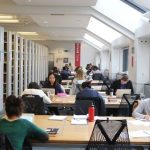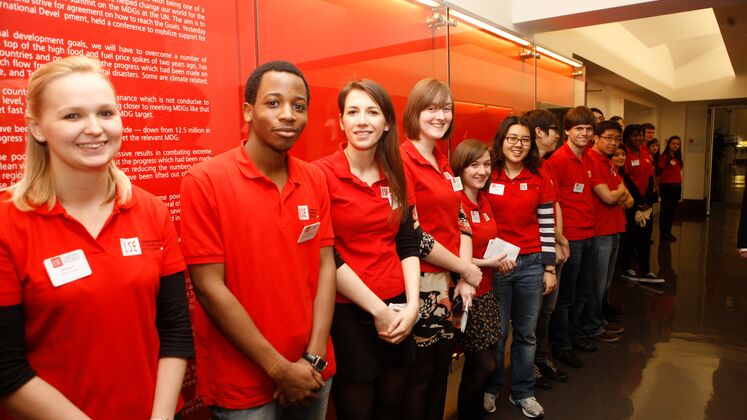The jump from sixth form/college to university is quite large. As well as there now being lectures and seminars/classes at LSE, it’s definitely a bonus to know a few more useful tips and resources that will help you familiarise yourself with the process now and get up to speed quickly. It certainly took me a while to get back into the academic swing of things coming off a gap year, where I had done zero academic work. Here are my top 10 tips I wish I had known before starting my lectures and seminars at LSE in earnest!
1 Free IT Software for LSE Students!
 LSE offers free subscriptions to the full Microsoft Office 365 suite on up to 10 devices and Sophos Anti-Virus software for students throughout their studies at LSE. Make use of this to organise you work and protect your devices from any viruses. It’s a bonus that you save money which is great for the struggling student!
LSE offers free subscriptions to the full Microsoft Office 365 suite on up to 10 devices and Sophos Anti-Virus software for students throughout their studies at LSE. Make use of this to organise you work and protect your devices from any viruses. It’s a bonus that you save money which is great for the struggling student!
2 Note-taking – pen/paper or laptop?
 Note taking is extremely important and it’s up to you to decide how to do that. Most people use their laptops in both lectures and seminars but some choose to go down the old fashioned route and write their notes. As first lectures tend to be more introductory and have less academic content, this is a good time to try out which method you prefer.
Note taking is extremely important and it’s up to you to decide how to do that. Most people use their laptops in both lectures and seminars but some choose to go down the old fashioned route and write their notes. As first lectures tend to be more introductory and have less academic content, this is a good time to try out which method you prefer.
3 Note-taking – online tools
 Try to have a rough idea how you will take notes in lectures and seminars. First, choose a platform to take notes on. Popular ones include OneNote, EndNote, Microsoft Word and Google Docs. This is entirely personal but figuring out your preferences in advance will help organise your work in the busy early weeks. Once chosen, stick to it so that it’s easy to find all your notes in one place.
Try to have a rough idea how you will take notes in lectures and seminars. First, choose a platform to take notes on. Popular ones include OneNote, EndNote, Microsoft Word and Google Docs. This is entirely personal but figuring out your preferences in advance will help organise your work in the busy early weeks. Once chosen, stick to it so that it’s easy to find all your notes in one place.
4 Organise your notes using folders
 Another tip I wish I had gotten in my first year is to find a standard way to organise and categorise my folders and notes. For example, a folder for my IR100 module with different sections like IR100 Week One Reading Notes IR100 Week One Seminar Notes, IR100 Week One Lecture Notes and so on. This makes a world of difference when trying to find material during the exam period!
Another tip I wish I had gotten in my first year is to find a standard way to organise and categorise my folders and notes. For example, a folder for my IR100 module with different sections like IR100 Week One Reading Notes IR100 Week One Seminar Notes, IR100 Week One Lecture Notes and so on. This makes a world of difference when trying to find material during the exam period!
5 Back-up your work
 Invest in a hard drive or back up your work to a cloud-based software such as OneDrive (which is available for LSE students). LSE can be quite demanding academically, and you don’t want to lose all your hard work in the event of your laptop getting stolen from a café or crashing. This way, you can be sure to minimise the damage to a certain extent.
Invest in a hard drive or back up your work to a cloud-based software such as OneDrive (which is available for LSE students). LSE can be quite demanding academically, and you don’t want to lose all your hard work in the event of your laptop getting stolen from a café or crashing. This way, you can be sure to minimise the damage to a certain extent.
6 Reading lists – don’t be afraid!
 If you are doing a non-quantitative subject, the reading lists in the first few weeks can be quite daunting. This is natural and soon you will get used to reading long pieces of academic text and identifying important arguments and facts. Check out LSE LIFE for a range of workshops for help.
If you are doing a non-quantitative subject, the reading lists in the first few weeks can be quite daunting. This is natural and soon you will get used to reading long pieces of academic text and identifying important arguments and facts. Check out LSE LIFE for a range of workshops for help.
7 Work/life balance
 Do your best to stay on top of your readings, but don’t get too stressed if you miss a couple here and there. LSE has more to offer than lectures. Make sure you get involved in societies and sports clubs!
Do your best to stay on top of your readings, but don’t get too stressed if you miss a couple here and there. LSE has more to offer than lectures. Make sure you get involved in societies and sports clubs!
8 Organise your workload
 Organisation and time management are key. Do not put off all your readings for the weekend or a later date. This will be discouraging when you actually have to do the work because there will be so much to do in one go.
Organisation and time management are key. Do not put off all your readings for the weekend or a later date. This will be discouraging when you actually have to do the work because there will be so much to do in one go.
9 Check out LSE study spaces
 Do a little tour by yourself or with friends of all the study spaces LSE has to offer so you can pick your favourite. The library is always a popular default option and probably has the most space to work when you don’t have lessons.
Do a little tour by yourself or with friends of all the study spaces LSE has to offer so you can pick your favourite. The library is always a popular default option and probably has the most space to work when you don’t have lessons.
10 Lectures and seminars – enjoy, engage and get involved!
 Enjoy and interact with what you are learning. Stay engaged in your seminars so that you can contribute to discussions and enhance your learning. Even if the subject matter is difficult and technical, don’t be afraid to ask questions – everyone is probably in the same boat. Some of the best minds in the world are teaching you a subject you have a genuine interest in. Make the most of this!
Enjoy and interact with what you are learning. Stay engaged in your seminars so that you can contribute to discussions and enhance your learning. Even if the subject matter is difficult and technical, don’t be afraid to ask questions – everyone is probably in the same boat. Some of the best minds in the world are teaching you a subject you have a genuine interest in. Make the most of this!





